HEALTH BOOKS ...
THE TYPE 2 DIABETES SOURCEBOOK
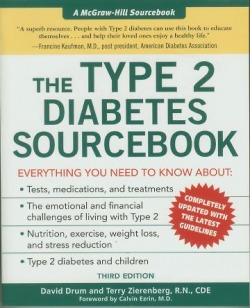
The Type 2 Diabetes Sourcebook, now in its 3rd edition, will help any person self-manage Type 2 or adult onset diabetes. In addition to practical tips on coping with this disease, the book is loaded with pertinent information to help people with Type 2 diabetes understand and achieve good self-management.
Co-written with diabetes expert Terry Zierenberg, RN, CDE, and published by McGraw-Hill, The Type 2 Diabetes Sourcebook includes medically-approved strategies of nutrition and exercise, an explanation of how diabetes affects the body, and many suggestions for increasing wellness, controlling weight, and achieving good health and good blood sugar control.
The Type 2 Diabetes Sourcebook includes an in-depth listing of major drugs used in diabetes treatment, tips for checking and managing blood sugar, an explanation of laboratory tests and how they are evaluated, stress-reduction techniques, tips for saving money on supplies as well as methods of dealing with common social problems encountered by people with diabetes. The third edition contains a useful new chapter on children with diabetes, a quick look at alternative therapies, and a listing of print and Internet resources.
Co-author Terry Zierenberg, R.N., C.D.E., is a diabetes care expert whose wide experience includes managing a large diabetes care program for a major Los Angeles area hospital.
"A SUPERB RESOURCE"
“The Type 2 Diabetes Sourcebook is a superb resource for all people with type 2 diabetes. This informative book addresses two of the most important health problems in the United States – the obesity epidemic, and the frightening increase in type 2 diabetes in children. Parents and grandparents with type 2 diabetes can use this book to educate themselves about what is often a family disease and help their children and grandchildren enjoy a healthy life.”
--Francine Kaufman, M.D., Past President, American Diabetes Association
“The kind of book for which the word “compendium” was invented, this is a straightforward, thorough resource book with something about everything. Written by David Drum and Terry Zierenberg, R.N., C.D.E., it contains an amazing amount of information about all aspects of diabetes, well organized and clearly presented.”
--Diabetes Health
“The authors have done an excellent job in improving on their own excellence! The new edition contains seventeen comprehensive, very well-written chapters with an excellent list of sources from diabetes organizations, support groups and magazines written for diabetics – and all within 410 pages…. This book should be read by all type 2 diabetics in the country and more importantly, read by the millions of undetected diabetics who wish to save their limbs, their eyes, and their lives.”
--Larry McMicking, armchairinterviews.com
THE CHRONIC PAIN MANAGEMENT SOURCEBOOK
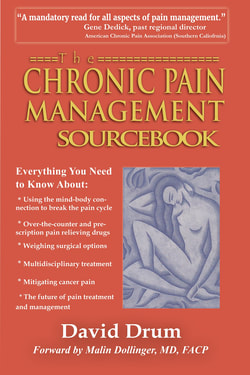
The Chronic Pain Management Sourcebook, recently updated by David Drum, provides a great deal of helpful information and practical pain management strategies for men and women suffering from the agonizing ordeal of chronic pain and their families.
The Chronic Pain Management Sourcebook explains the origins of many common types of pain, the importance of a good diagnosis, and the benefits of mind-body strategies such as biofeedback, meditation, and hypnosis.
Health writer David Drum has produced a useful book that contains a great many practical tips and suggestions to help alleviate pain and suffering, and a comprehensive listing of helpful resources.
"A WEALTH OF INFORMATION"
“The Chronic Pain Management Sourcebook provides a wealth of easily understood information regarding mind-body connection, definitions of chronic pain, mechanisms of pain, physiology of pain, physical conditioning, nutrition, social support, stress, medications, surgery and resources. The author gives readers many tools which empower them to take control of their condition and to participate in the diagnosis and management of their pain. I would recommend this book for any individual who has chronic pain.”
--Kathryn A. Weiner, PhD, The Pain Practitioner
“Does an excellent job of taking a complex medical subject and expressing it in lay terms.”
--Ben Schwachman, M.D., J.D., board-certified anesthesiologist in pain management
“The best resource for finding out how you can take optimal advantage of what is currently available.”
--Paul J. Rosch, M.D., F.A.C.P., president, American Institute of Stress
MAKING THE CHEMOTHERAPY DECISION
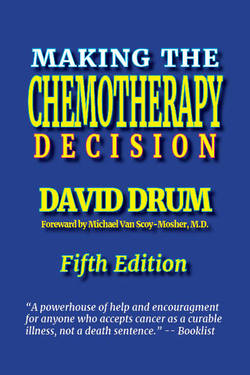
Making the Chemotherapy Decision, by David Drum, is a well-regarded, patient-centered sourcebook that provides useful information for people contemplating or undergoing chemotherapy treatment for cancer, and also for their families.
The newly-updated fifth edition of Making the Chemotherapy Decision is includes a complete explanation of chemotherapy. It lists 122 drugs used in chemotherapy and explains their most common side effects.
The fifth edition includes practical tips for handling the side effects of treatment, relevant nutritional information, new suggestions to control cancer pain and to mitigate stress, plus an introduction by famed radio host and oncologist Michael Van Scoy-Mosher, M.D.
"A POWERHOUSE OF HELP"
"A powerhouse of help and encouragement for anyone who accepts cancer as a curable illness, not a death sentence."
-- Booklist
“David Drum has succeeded admirably in explaining cancer chemotherapy to the patient and his or her family and friends. Making the Chemotherapy Decision is well-grounded scientifically, but carries explanations that are practical and easy to understand.”
-- Malin Dollinger, M.D., F.A.C.P.
"Making the Chemotherapy Decision is a valuable and supportive resource that walks you through the chemotherapy experience. It answers the most commonly asked questions and provides clinical information in an understandable way."
-- Selma R. Schimmel, founder of Vital Options ®
ALTERNATIVE THERAPIES FOR MANAGING DIABETES
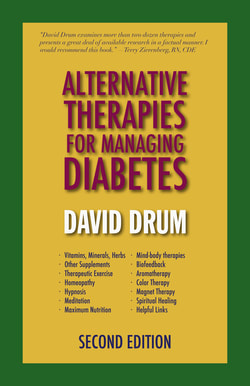
lternative Therapies for Managing Diabetes contains a great deal of useful information for people interested in exploring alternative or complementary therapies and using them in conjunction with good conventional medical treatment for Type 2 or Type 1 diabetes.
Alternative Therapies for Managing Diabetes contains 24 information-packed chapters that explain potentially useful alternative therapies. For people with diabetes, medical journalist David Drum evaluates available research on therapies such as vitamin and herbal supplements, mind-body therapies, homeopathy, hypnosis, acupuncture, aromatherapy, color therapy, and much more.
Alternative Therapies for Managing Diabetes is tailored for the person with diabetes who wishes to explore alternative therapies to supplement or enhance good diabetes self-management. There is more to diabetes treatment than insulin and blood sugar testing. The book includes useful information on what to expect from alternative therapies, tips on how to use them, and suggestions on evaluating their effectiveness.
"USEFUL AND COMPREHENSIVE!"
"Alternative Therapies for Managing Diabetes is a useful and comprehensive look at alternative therapies for people with Type 1 or Type 2 diabetes. David Drum examines more than two dozen therapies and presents a great deal of available research in a factual manner. I would recommend this book to anyone who is interested in "going a little farther" along the road to self-management."
--Terry Zierenberg, RN, CDE, co-author of The Type 2 Diabetes Sourcebook
WHAT YOUR DOCTOR MAY NOT TELL YOU ABOUT FIBROIDS
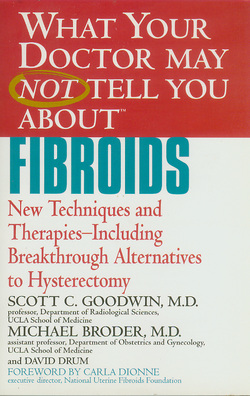
What Your Doctor May NOT Tell You About Fibroids: New Techniques and Therapies -- Including Breakthrough Alternatives to Hysterectomy, is a ground-breaking medical book by David Drum, Scott C. Goodwin, M.D., and Michael Broder, M.D.
Uterine fibroids are a common condition in women and one which can result in a great deal of confusion, fear, and mistreatment.
Fibroids are sometimes hastily treated by doctors who rush women into having a hysterectomy before explaining the latest and most effective new medical alternatives.
What Your Doctor May NOT Tell You About Fibroids explains how uterine fibroids develop, and takes a comprehensive look at all the medical alternatives including effective new forms of surgery and the technique of uterine fibroid embolization.
Dr. Scott C. Goodwin heads the Department of Interventional Radiology at U.C.L.A. Dr. Goodwin was the first physician in the United States to conduct and publish research on uterine fibroid embolization, a new technique which shrinks fibroids without surgery. Dr. Michael Broder conducted pioneering research on fibroid treatment at the Rand Corporation and is an obstetrician-gynecologist and surgeon at U.C.L.A.
"HIGHLY RECOMMENDED"
"Both of the UCLA School of Medicine, Goodwin (radiological sciences) and Michael Broder (obstetrics and gynecology) team up with medical writer David Drum to produce a highly informative guide to fibroids and their treatment…. This book thoroughly discusses how fibroids grow, the diagnostic tests used to distinguish them from other conditions, and major symptoms. The roles of diet, exercise, stress reduction, and alternative treatments such as homeopathy and acupuncture are also covered. The book's greatest strength lies in the final chapters, which explain uterine fibroid embolization, myomectomy, and new alternative treatments, both invasive and drug-based. A glossary, bibliography, and lists of organizations, books, and web sites complete the volume. Highly recommended for most women's health collections."
-- Library Journal
POLYCYSTIC LIVER DISEASE
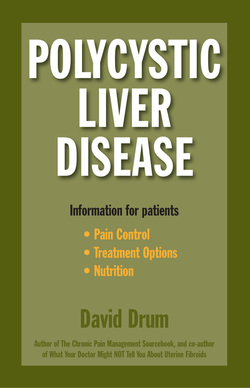
When the daughter of medical journalist David Drum was diagnosed with polycystic liver disease, he began looking for information about this relatively rare disease. He found precious little basic information for patients, and none available in book form. After doing extensive research to help his daughter understand and manage her disease, Drum condensed the information he found into this short, useful book.
Polycystic Liver Disease: Information for Patients contains basic medical information for people who wish to learn more about polycystic liver disease. The first book of its type, Polycystic Liver Disease includes useful information on diet, herbs, and lifestyle. It examines the origins of the disease, risk factors, the important role of the liver in the body, the formation of cysts, and treatments for the most common symptoms including the symptom of pain.
Of particular interest is a survey of the five major treatments used to treat symptomatic polycystic liver disease. Although the disease is not life-threatening, for one out of five patients, an invasive treatment or surgery may ultimately be necessary. Drum provides objective information on each of these treatments, and examines the benefits, drawbacks, and possible complications for each.
Polycystic Liver Disease surveys the new drugs of potential benefit now undergoing clinical trials, and other new treatments such as hepatic artery embolation. The book includes a survey of medical tests which may be employed by your doctor, a list of useful web sites, a glossary, and a bibliography of sources.
Contact David Drum, CLICK HERE